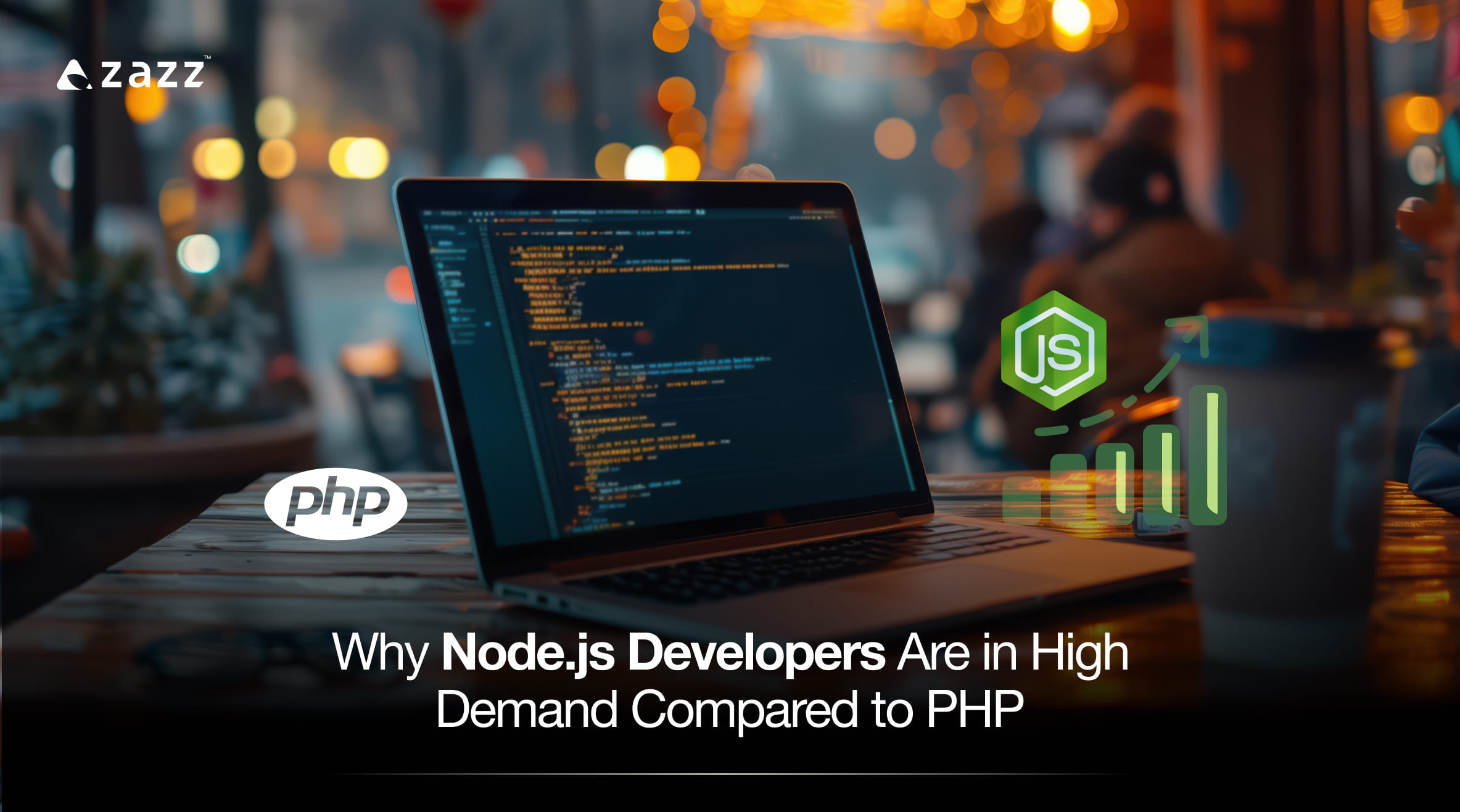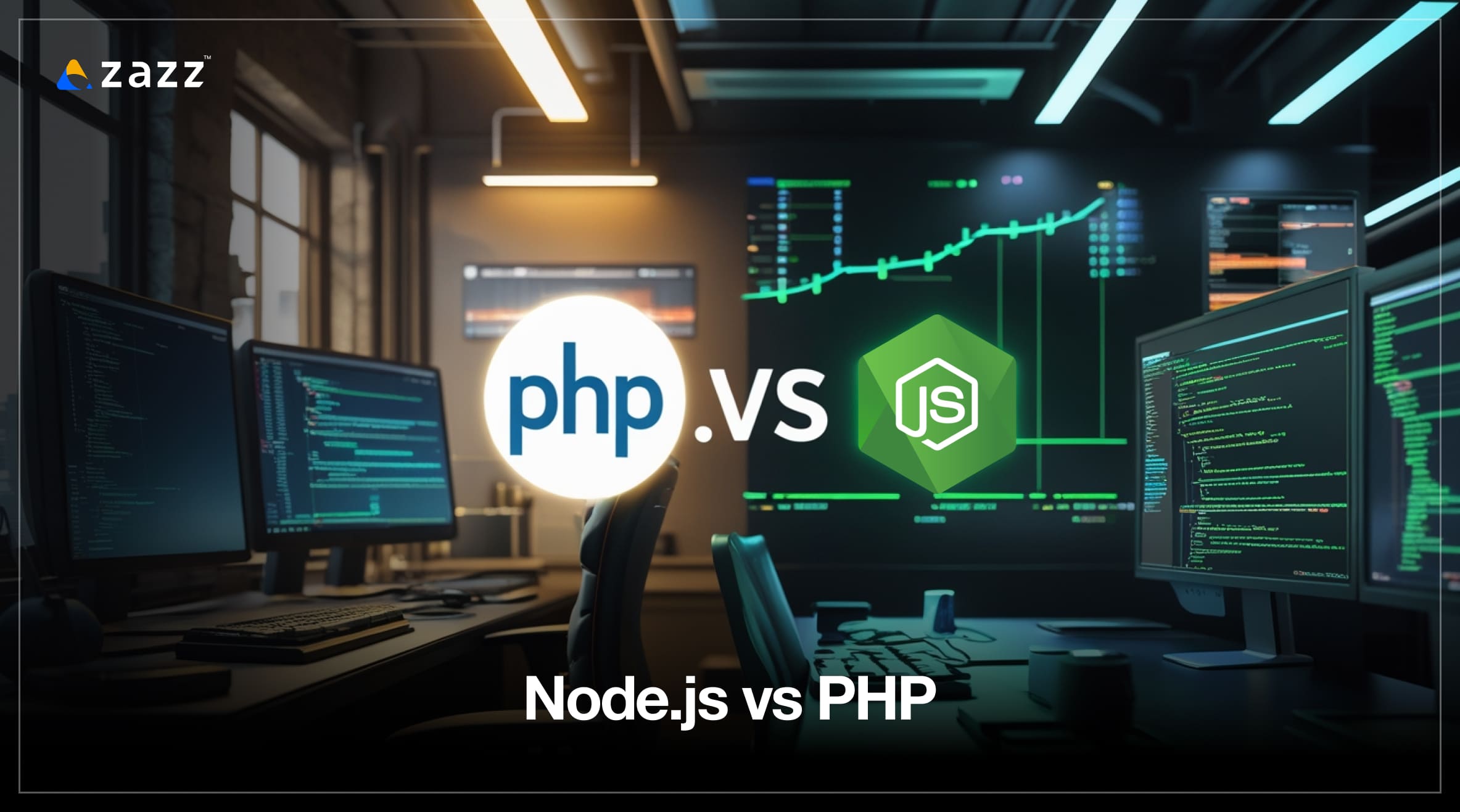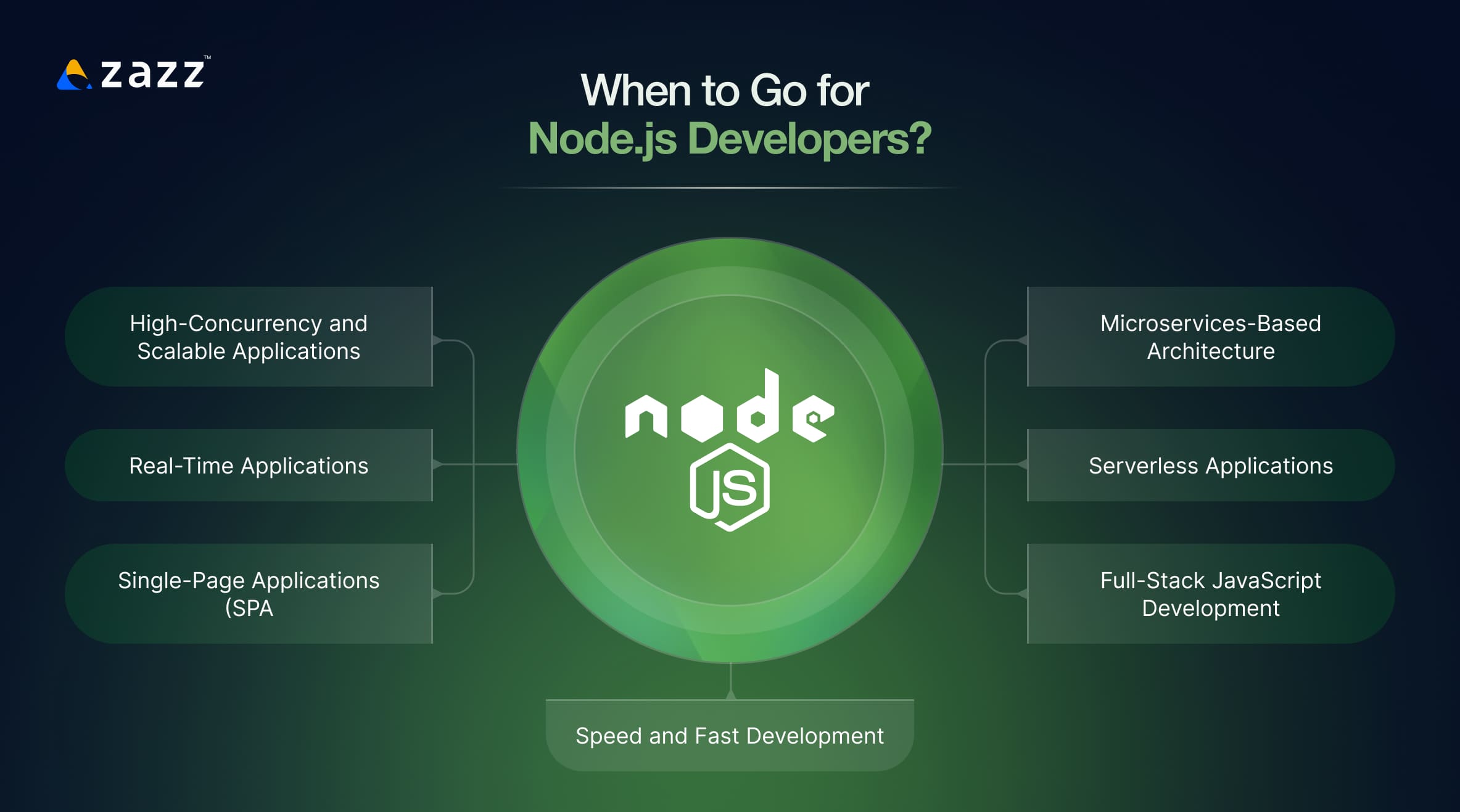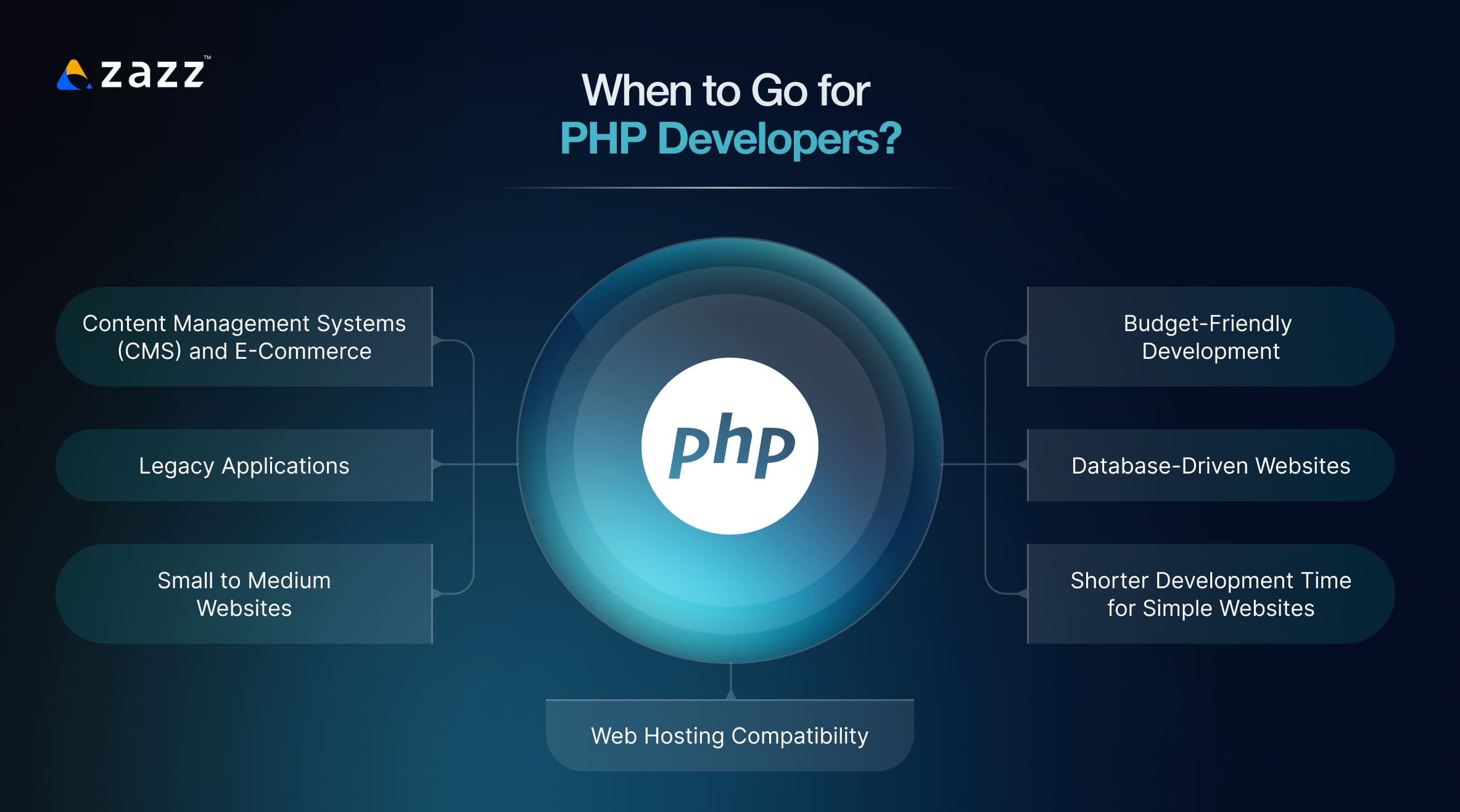
In web development, choosing the right technology stack can make or break the success of a project. Two of the most popular technologies for backend development are Node.js and PHP. Both have their merits, but there is no denying that Node.js has surged in popularity over the last few years, while PHP, despite its legacy and solid community, has seen a slight decline in demand.
The question is, why are Node.js developers in higher demand compared to PHP developers in today’s market? Is it because Node.js is inherently superior to PHP, or are there other factors at play? To answer this, we need to look at various aspects of Node.js vs PHP including performance, scalability, developer productivity, and real-world use cases.
Let’s explore why Node.js developers are increasingly sought after and why Node.js is often considered a better choice compared to PHP in many modern applications.
Node.js vs PHP: An Overview

Before diving deep into the factors contributing to the rise of Node.js, it’s essential to understand the fundamental differences between Node.js and PHP.
PHP is a server-side scripting language that has been a staple of web development for many years. It is commonly used for building dynamic web pages and applications, and it powers a large portion of the internet today, including popular content management systems like WordPress. PHP has extensive documentation, a massive library of frameworks like Laravel and Symfony, and a large developer community.
On the other hand, Node.js is a JavaScript runtime built on Chrome’s V8 engine that allows developers to use JavaScript for server-side programming. Initially, JavaScript was confined to the browser, but with Node.js, developers can now write both client-side and server-side code in the same language, leading to faster development cycles and more cohesive codebases.
Related reading: Guide to Mobile App Backend Development
1. Performance: Node.js vs PHP Performance
One of the most significant factors contributing to the rise in demand for Node.js developers is the performance of Node.js compared to PHP. When it comes to Node.js vs PHP performance, Node.js has a distinct edge.
- Asynchronous, Non-Blocking I/O: Node.js is built on an event-driven, non-blocking I/O model, meaning that it can handle multiple requests simultaneously without waiting for each one to finish. This makes it highly efficient, especially for real-time applications like chat applications or live updates.
- Single-Threaded Model: Node.js operates on a single-threaded event loop, which allows it to manage concurrent requests more efficiently without the overhead of managing multiple threads. PHP, on the other hand, typically handles requests sequentially, which can create bottlenecks when handling large amounts of traffic.
In Node.js vs PHP performance, Node.js shines when handling concurrent connections, especially in real-time applications. While PHP’s performance is more than adequate for traditional web applications, Node.js is better suited for high-traffic, I/O-intensive applications, such as live streaming, gaming, and APIs with heavy concurrent connections.
2. Scalability: Why Node.js Outperforms PHP
Another critical factor contributing to the rise of Node.js developers is its scalability. When discussing PHP vs Node.js, Node.js offers several advantages for building scalable applications.
- Horizontal Scalability: Node.js can scale horizontally by adding more instances across different servers. Thanks to its non-blocking, event-driven nature, it can efficiently manage additional traffic by distributing the load across multiple instances.
- Microservices Architecture: Node.js is well-suited for microservices-based architecture, where an application is divided into smaller, loosely-coupled services that can be scaled independently. This architecture allows Node.js applications to handle increased traffic without a significant performance hit.
In comparison, PHP typically doesn’t scale as efficiently in handling high concurrency or managing large numbers of simultaneous connections. While PHP can be used to build scalable applications, it often requires additional configurations, such as using load balancers or caching mechanisms, to achieve performance levels comparable to Node.js.
3. Real-Time Applications and Full-Stack Development
The rise of real-time applications like chat apps, gaming platforms, and collaborative tools has further cemented the role of Node.js in modern web development. Node.js enables developers to build these applications with ease, thanks to its non-blocking I/O and WebSocket support. In contrast, PHP was not originally built for real-time applications, although libraries and workarounds exist.
Additionally, Node.js has a significant advantage in the world of full-stack development. Since both front-end and back-end developers can use JavaScript, the ability to share code between the client and the server becomes seamless. PHP, by contrast, requires different technologies on the front end (such as HTML, CSS, and JavaScript) and back end, often leading to challenges in synchronizing code and handling large-scale projects.
Is Node better than PHP for real-time applications and full-stack development? The answer is yes, as Node.js is a more natural fit for these use cases, allowing developers to write and maintain a unified codebase.
4. Developer Productivity and Ecosystem
Another reason why Node.js developers are in high demand is because of the immense developer productivity and ecosystem that Node.js offers. The Node Package Manager (NPM) is a key component of this ecosystem, as it provides access to a vast library of open-source packages that can drastically reduce development time.
PHP, while it has a strong ecosystem, especially with frameworks like Laravel, does not offer the same breadth of modern tooling that Node.js does. For example, the NPM ecosystem provides easy access to tools like Babel, Webpack, and Express, making it simpler to set up and manage large-scale applications. Developers often find that the rapid development and deployment cycle enabled by Node.js are highly beneficial, leading to faster time-to-market.
5. Community and Support: Node.js vs PHP
Both Node.js and PHP have large, active communities, but Node.js has gained significant traction in recent years, particularly in the world of startups and tech companies. The open-source community surrounding Node.js is highly vibrant, and many cutting-edge technologies, such as serverless computing and microservices, are being built with Node.js in mind.
While PHP also has an established community with decades of resources and documentation, Node.js has benefited from its association with JavaScript, a language that has seen massive adoption across both client and server-side development.
Why Node.js Developers Are in High Demand
The demand for Node.js developers is a direct result of the advantages Node.js offers over PHP in terms of performance, scalability, and developer productivity. The shift towards real-time applications, microservices architectures, and full-stack JavaScript development has made Node.js the preferred choice for many businesses and startups looking to build fast, scalable, and modern applications. PHP continues to be a reliable technology for many use cases, but when it comes to high-performance applications, handling real-time interactions, and achieving rapid development cycles, Node.js has proven to be the better choice.
As more developers and companies embrace Node.js, the demand for Node.js developers will likely continue to grow, making it a top skill for anyone looking to excel in the web development space.
Hire Top Node.js developers from Zazz– Leading Staff Augmentation company in the US.
Related reading: Mobile App Development Costs Guide
When to Go for Node.js Developers?

Choosing Node.js developers is a great option for certain types of projects, especially when you need specific capabilities and features that Node.js excels at. Below are the key scenarios when hiring Node.js developers makes sense:
1. Real-Time Applications
If your project requires real-time features, such as instant messaging, live updates, or collaboration tools, Node.js is an ideal choice due to its asynchronous, event-driven, non-blocking I/O model. Node.js developers are perfect for building applications like:
- Chat applications
- Live streaming
- Online gaming platforms
- Real-time notifications
Node.js can efficiently handle many concurrent connections, making it the best option for real-time interactivity.
2. High-Concurrency and Scalable Applications
When your application is expected to handle a large number of simultaneous connections, such as APIs or services that need to serve thousands or even millions of users, Node.js shines. Its non-blocking, event-driven architecture is well-suited for managing large volumes of concurrent requests efficiently.
- API backends that need to handle high volumes of data requests (RESTful APIs or GraphQL)
- Microservices architecture: If you’re building a system that requires scaling individual components independently.
If your application involves scaling horizontally (across multiple servers) or requires fast, scalable infrastructure, Node.js developers are the right choice.
3. Single-Page Applications (SPA)
If you are developing a Single-Page Application (SPA), Node.js is a solid choice. SPAs, where the page dynamically updates without refreshing, can benefit from using JavaScript both on the client and server-side. This simplifies the development process by using a unified language throughout the stack.
- Node.js developers can use JavaScript throughout both the client and server side, making it easier to manage data and code flow between the back-end and front-end development.
4. Microservices-Based Architecture
If your project is based on a microservices architecture, Node.js developers are the best fit. Node’s lightweight nature, combined with its high performance and scalability, makes it ideal for building independent, small services that communicate with each other via APIs.
- Node.js is well-suited for building isolated, independent microservices that can be deployed, scaled, and maintained separately.
5. Full-Stack JavaScript Development
If your development team is using JavaScript on the front end (e.g., React, Angular, or Vue), then hiring Node.js developers is ideal for maintaining consistency across the stack. Full-stack development with JavaScript allows for better code reusability, faster communication between client and server, and easier collaboration between back-end and front-end developers.
If you are building an application that requires a unified, consistent development language (JavaScript), Node.js developers can provide seamless integration between the front-end and back-end.
6. Serverless Applications
For projects that need to scale quickly, with minimal management, serverless computing might be the way to go. Node.js is one of the best languages for serverless environments due to its quick startup times and efficiency. Services like AWS Lambda, Azure Functions, and Google Cloud Functions work well with Node.js.
Hiring Node.js developers makes sense if you’re looking to build applications using a serverless model that requires high efficiency and scalability without managing traditional server infrastructure.
7. Speed and Fast Development
Node.js is often chosen for projects that need fast development cycles and high performance. If your project has tight deadlines and needs to be built and deployed rapidly, Node.js is a great fit due to its large ecosystem of libraries and tools.
- Node.js developers can use libraries like Express.js, NestJS, or Koa.js to speed up development without sacrificing quality.
If you want your project to be delivered quickly without compromising performance, hiring Node.js developers ensures fast, reliable, and scalable applications.
Looking for a skilled Node.js developer? Contact Zazz to onboard seasoned Top Node.js developer onshore, offshore and nearshore
Related reading: What is the time required for launching a mobile app?
When to Go for PHP Developers?

On the other hand, PHP developers are a great fit for projects where PHP excels. Despite the rise of newer technologies, PHP remains a widely-used and robust tool for many types of web development. Here are scenarios where hiring PHP developers makes more sense:
1. Content Management Systems (CMS) and E-Commerce
If your project revolves around content management, such as blogs, websites, or e-commerce platforms, PHP is a go-to solution. PHP is the backbone of popular content management systems (CMS) like WordPress, Joomla, and Drupal.
- WordPress: If you need a website that’s easy to manage and build without extensive custom coding, PHP developers are needed to customize themes, plugins, and ensure optimal performance.
- E-commerce: If you’re building an online store, platforms like WooCommerce (WordPress-based) or Magento (built with PHP) are excellent options. PHP developers can help you customize these platforms to suit your business needs.
2. Legacy Applications
If you’re maintaining or upgrading a legacy application that was built with PHP, hiring PHP developers is necessary. PHP is still one of the most widely used languages for web applications, and many older applications are built with it.
- If your business already has an existing PHP-based application that needs new features or improvements, PHP developers are best suited for ensuring compatibility with the old system while adding new functionality.
3. Small to Medium Websites
For simpler, small to medium-sized websites, PHP can be a highly effective and cost-efficient option. PHP developers can quickly build websites, blogs, or portfolios with minimal setup, leveraging PHP’s vast ecosystem of frameworks, tools, and templates.
- PHP is perfect for projects that don’t require advanced real-time features or complex backend processing.
4. Database-Driven Websites
If your project involves building websites that rely heavily on database interaction (e.g., displaying data from MySQL, PostgreSQL, or other databases), PHP is a solid choice. It integrates seamlessly with relational databases and is often used for applications where data storage and retrieval are essential.
- PHP developers can build applications like product catalogs, blogs, and job boards that rely on managing and displaying database-driven content.
5. Budget-Friendly Development
If your project has a tight budget, PHP developers might be the right choice. PHP hosting is extremely affordable, and there is a vast pool of PHP developers available at various price points. The language is relatively easy to learn and deploy, meaning that development costs can often be lower compared to more complex frameworks or languages like Node.js.
6. Shorter Development Time for Simple Websites
If you’re building a website that doesn’t require complex, real-time features but needs to be built quickly, PHP developers can deliver fast results with ready-made frameworks like Laravel, Symfony, or CodeIgniter. These frameworks allow developers to create fully functional websites with minimal setup time, making PHP a great option for projects with quick timelines.
7. Web Hosting Compatibility
If your project needs to be deployed on shared or budget hosting, PHP development is a natural choice. PHP is supported by virtually all hosting providers, and it’s highly compatible with server environments such as Apache, making it easy to deploy websites and web applications without worrying about custom server configurations.
Related reading: Ensuring Excellence: The Imperative of Mobile App Quality Assurance
Conclusion:
Both Node.js and PHP have their strengths, and the decision of which developer to hire depends on the specific needs of your project. If you need a fast, scalable solution with real-time capabilities, Node.js developers are the way to go. If you’re building a traditional website or content-heavy platform, PHP developers will help you get up and running efficiently.
Frequently Asked Questions
The main difference between Node.js and PHP lies in their execution model. Node.js is a runtime environment built on Chrome’s V8 JavaScript engine, allowing JavaScript to be run server-side. It uses a non-blocking, event-driven, single-threaded model, making it great for handling high concurrency and real-time applications. PHP, on the other hand, is a server-side scripting language primarily used for dynamic web pages and relies on a synchronous, blocking model for request processing.
While Node.js is ideal for applications that require real-time interactions, scalability, and performance, PHP is often used for content-driven websites, content management systems (CMS), and simpler web applications.
You should hire Node.js developers when:
- You are building real-time applications, such as chat apps, gaming platforms, or collaboration tools.
- Your project needs high concurrency (handling thousands of simultaneous connections).
- You’re developing Single-Page Applications (SPA) and want a unified full-stack JavaScript environment.
- You require a microservices architecture to scale individual components independently.
- You’re using a serverless architecture with services like AWS Lambda, which Node.js is well-suited for.
If your project focuses on performance, scalability, or real-time interactions, Node.js developers are the best fit.
While Node.js can be used to build e-commerce websites, PHP is generally considered a better fit for this purpose, particularly due to the popularity of PHP-based platforms like WooCommerce (built on WordPress) and Magento. These platforms offer a wealth of pre-built features, plugins, and integrations that make setting up an e-commerce store easier and faster with PHP.
However, if your e-commerce platform requires real-time features like live chat, real-time inventory updates, or complex integrations, Node.js might be more suitable due to its high performance and scalability.
PHP can handle concurrent requests, but not as efficiently as Node.js. PHP operates in a synchronous, blocking manner, which means it handles one request at a time per process. While this can work for traditional web applications with moderate traffic, Node.js excels in handling high concurrency because it uses a non-blocking, event-driven model. For applications with thousands of simultaneous users or real-time features, Node.js is a better choice for high concurrency scenarios.
PHP is a great choice for:
- Content-driven websites: If you are building blogs, news sites, or any website that relies on a Content Management System (CMS) like WordPress, Joomla, or Drupal.
- Database-driven applications: PHP integrates well with relational databases such as MySQL, making it an ideal choice for applications that heavily interact with databases.
- Rapid development of traditional websites: For smaller websites or simpler projects, PHP allows for fast prototyping and deployment with minimal overhead.
- Budget-friendly solutions: PHP has an established ecosystem with affordable hosting, making it an excellent choice for businesses with tight budgets.
If your project is content-based or involves leveraging well-established CMS platforms or requires simpler server-side processing, PHP will be the better option.
Yes, you can use Node.js for traditional websites, but it might not be the most efficient choice. Node.js excels in applications that require real-time communication or high concurrency, but for standard websites that don’t require those features, PHP can be more cost-effective and easier to implement.
Node.js can still handle traditional websites, especially if you’re aiming to have a full-stack JavaScript environment. However, if your project is relatively simple (e.g., a static site or a basic dynamic site), PHP would be quicker to develop and deploy, especially with frameworks like Laravel or Symfony.
When considering whether Node is better than PHP, there are certain factors that clearly favor Node.js. Node.js is generally more suitable for modern applications, particularly those involving real-time features, high scalability, and the need for fast, efficient handling of concurrent requests. While PHP is still an excellent choice for traditional web applications, content management systems, and projects where simplicity and a large pool of developers are required, Node.js is often the preferred choice for building more complex, high-performance applications.
Recent Articles
Table of Content 1. Data Engineer vs. Data Scientist: Understanding...
Table of Content 1. What is the Carnival in Brazil?...
Table of Content 1. What is IT Staff Augmentation? 2....












